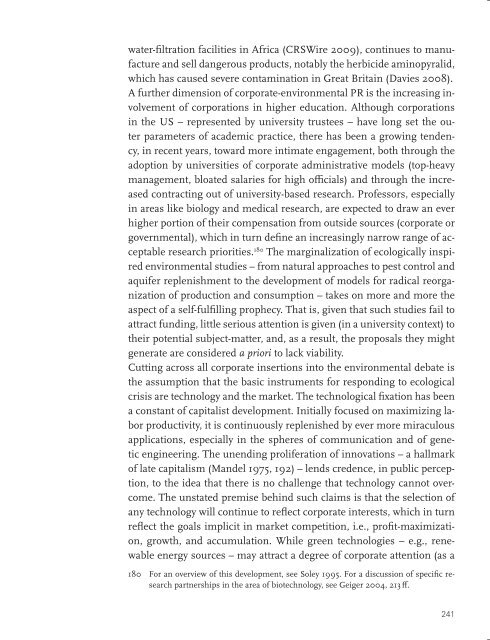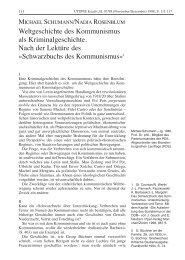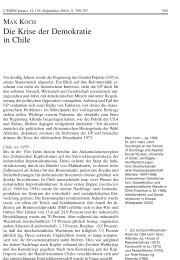Grünen Kapitalismus - Rosa-Luxemburg-Stiftung
Grünen Kapitalismus - Rosa-Luxemburg-Stiftung
Grünen Kapitalismus - Rosa-Luxemburg-Stiftung
Erfolgreiche ePaper selbst erstellen
Machen Sie aus Ihren PDF Publikationen ein blätterbares Flipbook mit unserer einzigartigen Google optimierten e-Paper Software.
water-filtration facilities in Africa (CRSWire 2009), continues to manufacture<br />
and sell dangerous products, notably the herbicide aminopyralid,<br />
which has caused severe contamination in Great Britain (Davies 2008).<br />
A further dimension of corporate-environmental PR is the increasing involvement<br />
of corporations in higher education. Although corporations<br />
in the US – represented by university trustees – have long set the outer<br />
parameters of academic practice, there has been a growing tendency,<br />
in recent years, toward more intimate engagement, both through the<br />
adoption by universities of corporate administrative models (top-heavy<br />
management, bloated salaries for high officials) and through the increased<br />
contracting out of university-based research. Professors, especially<br />
in areas like biology and medical research, are expected to draw an ever<br />
higher portion of their compensation from outside sources (corporate or<br />
governmental), which in turn define an increasingly narrow range of acceptable<br />
research priorities. 180 The marginalization of ecologically inspired<br />
environmental studies – from natural approaches to pest control and<br />
aquifer replenishment to the development of models for radical reorganization<br />
of production and consumption – takes on more and more the<br />
aspect of a self-fulfilling prophecy. That is, given that such studies fail to<br />
attract funding, little serious attention is given (in a university context) to<br />
their potential subject-matter, and, as a result, the proposals they might<br />
generate are considered a priori to lack viability.<br />
Cutting across all corporate insertions into the environmental debate is<br />
the assumption that the basic instruments for responding to ecological<br />
crisis are technology and the market. The technological fixation has been<br />
a constant of capitalist development. Initially focused on maximizing labor<br />
productivity, it is continuously replenished by ever more miraculous<br />
applications, especially in the spheres of communication and of genetic<br />
engineering. The unending proliferation of innovations – a hallmark<br />
of late capitalism (Mandel 1975, 192) – lends credence, in public perception,<br />
to the idea that there is no challenge that technology cannot overcome.<br />
The unstated premise behind such claims is that the selection of<br />
any technology will continue to reflect corporate interests, which in turn<br />
reflect the goals implicit in market competition, i.e., profit-maximization,<br />
growth, and accumulation. While green technologies – e.g., renewable<br />
energy sources – may attract a degree of corporate attention (as a<br />
180 For an overview of this development, see Soley 1995. For a discussion of specific research<br />
partnerships in the area of biotechnology, see Geiger 2004, 213 ff.<br />
241













